by Shea Megale
This is the story of a bunch of Englishmen with rifles.
Really, how can you go wrong?
You can't. Especially not if you imagine the British accents the whole time. Which I highly recommend.
Anyway, our story begins with a fancy black-tie affair, a grumpy dad and a lovesick half-sister, some raspberry sauce, and a possibly nonexistent---nooo, that would be giving too much away.
And, of course, the Emporium. The world's last remaining zoo, created after world war was barely staved off by the release of a dreadful poison that nearly destroyed the natural world. The toxin leeched into the world's ecosystems and destroyed nearly all animal life. Youths from all over the world flock to the Emporium to become Hunters, brave and reckless souls who venture into the wild to win fame and fortune by bringing back the world's last animals. And who, often, don't come back.
Tyber has the bad luck of being the son of two of the most famous Hunters of all, the captors of the polar bear. As such, his father expects a good deal more of him than photography, mastery of sign language, and bearing the daily shame of his illegitimate birth.
90 years after the near-annihilation of the natural world, the glory of the Emporium and the Victorian era has all but ground to a halt. But one evening, a deadly new Hunt is announced. And Tyber, as caged as his father's polar bear and burning with resentment, takes destiny into his own hands.
I had the great pleasure and privilege of reading this book, written by my authorly friend Shea Megale, before almost anyone else, as it is not yet published. That's right, you have to wait. I wrote a CLIFFHANGER book review, for which I must beg your pardon, while giggling evilly inside. Bwa-ha-ha. Anyway. When Emporium comes out, I highly recommend you read it! Well and sensitively written, with an original Victorian-Steampunk-safari (betcha never heard that phrase before) setting and storyline, and a new twist on issues as old as humanity itself. Love the characters, especially Sandy...well, you'll find out. And per Shea's insistence, I must add, Xander is hot.
for: teens and adults
Content rating: I'm gonna say 3/5. This one is tricky, since one of the book's themes is homosexuality, which many including myself consider erroneous for moral reasons. If you find homosexuality offensive or immoral, this book may not be for you. However, nothing at all of an explicit nature occurs. Aside from that, there are a few swear words and mention of cheating/an affair.
My enjoyment: 4/5 Loved Emporium, but my heart really belongs to Shea's next book series Starborn. Look for the review!
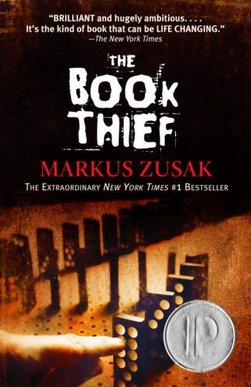 by Markus Zusak
One of the most beautiful, grim, intriguing, lovable books that I have ever read.
And that, as many of you know, is saying a lot.
Yeah, this book pretty much rocks. It's told in an...original way. And the narrator is now one of my all-time favorite book characters.
The Book Thief takes place (refreshingly, I thought) in Nazi Germany. I've heard a lot of the Allies' side of WWII. I enjoy historical fiction and found it interesting to learn about the life of ordinary German people at this point in history.
As the story opens, nine-year-old Liesel Meminger is traveling by train with her mother and little brother to Munich, where the siblings will live with a foster family. Liesel's brother never makes it. When the mother and daughter arrives in Munich several days later, Werner is dead from illness and buried in a nameless town's cemetery and Liesel carries a stolen book in her snow-bitten hands.
That book is the first of several, and it is through the books that Liesel's story is told.
Still reeling from grief and plagued by nightmares, Liesel settles into life in her new home on Himmel Street in the poor part of town. Life with the Hubermanns has few luxuries, but she comes to love her kind foster father and even her hard-edged new mother. She befriends the irrepressible Rudy Steiner (who is widely acknowledged by all to be insane), learns to devour books with a passion, and dutifully attends all her Hitler Youth meetings. However, war and Nazi ideals overshadow the lives of all German citizens, and Liesel's happy enough lifestyle is threatened when a promise made years ago brings a Jewish refugee to hide in her home.
One of my favorite things about this book is the excellent job Zuzak does developing the characters into real people with faults, virtues, dreams, and adventures. It's a great, complex plotline and a realistic historical setting where childish escapades can mean playing with life and death.
for: Adults and teens
Content rating: 3/5 There's plenty of death, violence, swearing, and crime. I'll add that I am now more familiar with German profanity than I ever thought I'd be.
My enjoyment: 5/5
Read. It.
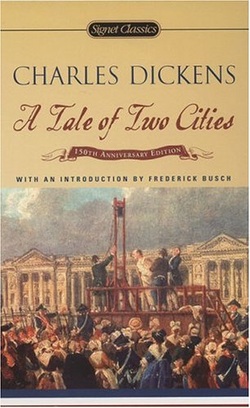 by Charles Dickens
This is, so far, my favorite of Dickens' novels. (Save perhaps for A Christmas Carol, which is short and sweet.) I'm guessing you're wondering what the two cities are. What do you think?
I'll give you two hints: British lawyers and the French Revolution.
Forgive me, but I have generally found Mr. Dickens' books to be rather slow in plot and not always capable of holding my interest. (Although it is too a possibility that I possess the attention span of highly caffeinated chipmunk). Neither do I regard most of Dickens' characters as the brightest bulbs on the string.
Not so with this book.
This isn't to say that the plot moves along with a tenth the speed of, say, a James Patterson novel, but for Dickens I really can't complain. It's highly interesting, too, no classic orphan-boy theme here. The cast of characters includes a bunch of British lawyers, a prisoner and his daughter, some French aristocracy, and a whole lot of irritated Frenchmen and women. On the whole, they provide a more intriguing and entertaining plot than you could generally trust any number of British lawyers to do.
As the story opens, one of the lawyers accompanies a young lady to France to rescue her father from delirium, following his release from a long imprisonment. Here, the stage is already being set for a good revolution, as the aristocrats treat the commoners like dirt and the peasants mutter ominously amongst themselves. The young lady, Miss Manette, effectively calls her father back to life. Later, living in London, the two make the acquaintance of the handsome Charles Darnay, who does his best to put his mysterious past behind him. They also meet the talented but miserable, directionless Sydney Carton, who has a curious connection to Darnay. And with this cast of characters (did I mention the British lawyers?) Dickens leads us from peaceful London into war-torn, bloody Paris, and hopefully out again.
As well providing an excellent storyline, this book captures very well the savage passions surrounding the French Revolution. Someday, I hope that someone will explain to me why those people were so proud of their revolution. It seems to me that they made a terrible mess of it, and unfortunately I mean that in a literal sense. Nevertheless, I liked this book a lot. Read it.
for: adults and teens
Content rating: I'm gonna say 4/5. Plenty of violence pertaining to the revolution, but I don't recall anything else objectionable.
My enjoyment: 4/5
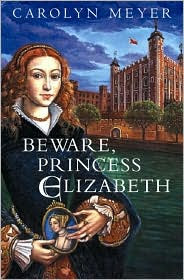 by Carolyn Meyer
This book is an enjoyable children's historical fiction novel about Queen Elizabeth Tudor. I mean the original one, daughter of Henry VIII and sister to Bloody Mary.
It's an observant and, I presume, historically accurate account of Elizabeth's relationships with her family and her life during the reign of her brother Edward and sister Mary. It's reasonably well-written, though simply told, from Elizabeth's point of view. I did not, however, appreciate all of the insights into the lady's mind, as most of them consisted of either "Someday, I will be queen" or the equally melodramatic "I shall never marry". While I realize that it's necessary to make certain assumptions when writing a historical fiction novel, I think we can afford to make them a little less repetitive. It's pretty annoying, I think, when an author goes on and on about a single little point. I mean, I recognize that repetition is important for unifying a work of art or writing. I respect that. I really do. But I think that at some point you have to step back and realize, hey, I've made this point clear enough even for the most dim-witted of readers to comprehend. Otherwise, you just bore readers into closing the book or hitting the Escape button to Escape your endless blog post. Face it, we all have to respect our readers' time. Mutual respect is important between an author and her readers. And that's why most of us can't stand it when someone goes on and on about something, and we're like, "Ok, I think I get the point already!"
Anyway. What was I saying? Oh yes. Something about Elizabeth Tudor. This book is a fun way to learn about one of the more fascinating people in history, and about life and the royal court in 16th century England. Those at court were masters of intrigue, which is probably why most of them got their heads chopped off at some point. That our friend Elizabeth survived is reason enough to congratulate her. This is, as I said, a children's book, and is neither sufficiently in-depth, historically speaking, nor involved enough to satisfy an adult or older teenager.
Carolyn Meyer has written several other books in this vein, which include similar novels about Anne Boleyn, Mary Tudor, and queen Catherine.
for: children and younger teens
Content rating: 4.5/5 Unsurprisingly, there are a few mentions of love affairs. And lots of people die. Nothing particularly graphic.
My enjoyment: 3.5/5 I enjoyed it more when I first read this book as a younger teen. I guess my tastes have matured some. More detail! More history!
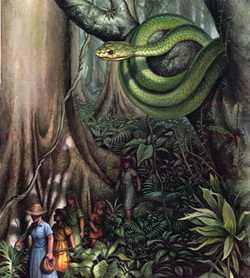 by Barbara Kingsolver
So maybe I should've debated long and hard about what book to review first. I didn't. Funnily enough, this isn't even representative of most of my reading choices. Maybe it's time to change that, because The Poisonwood Bible is a wonderful book.
The story takes place largely in the Congo, starting in 1959, and covers a span of about 30 years. It tells the story of a missionary family: Georgia housewife Orleanna Price and her four girls Rachel, Leah, Adah, and Ruth May, led by their fiercely obsessive preacher father, who leave their small town of Bethlehem, Georgia for the perilous beauty and hardship of the Congolese jungle. There the unyielding Nathan Price strives to bring a village full of poor Africans unto God's light, but at some cost to his family. With alternate undertones of adventure and regret, the five women take it in turns to tell their story of blunders and tragedy. For me, the five different narrative voices made the book compelling because it developed all the main characters--and their very different personalities--extremely well. Though the main focus of the book is the story of the Price family, the fascinating history of the Congo is also neatly incorporated. Against a backdrop of jungle isolation and, further out, political unrest, the Prices come to understand their African neighbors, cope with family tragedy, and reshape lives that can never be the same.
For: adults and teens
Genre: historical fiction
Content rating: 4/5 Mention is made of some sexual affairs but not explicitly in any way. There is also occasional profanity.
My enjoyment: 5/5
|

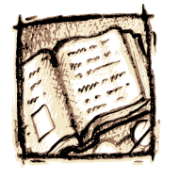



 RSS Feed
RSS Feed